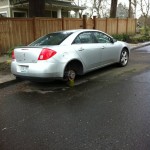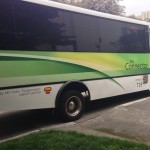- Rob Meyer’s old wheels
- and new wheels
By Micheline Maynard
Rob Meyer is from Ann Arbor, Mich., where he didn’t think public transportation was extensive enough to be a full replacement for a car. (Editor’s note: some people might disagree.) And when he headed west after college, the first thing he did was buy one. But then he moved to the Capitol Hill neighborhood of Seattle, and a car became less important.
Here’s his Transportation Diary, in prose and data.
“I grew up in Michigan (Ann Arbor) where there was a big car culture and where public transit wasn’t extensive enough to be a full replacement for a car. When I moved to Bellevue, WA after college, it seemed like a no-brainer to get myself a car. The east side [of Lake Washington] is much more suburban and spread-out than Seattle proper, so having my own car was quite convenient, but not as necessary as it had been back in Michigan.
I later moved into Capitol Hill, Seattle, and fell in love its higher density of bars, restaurants, and entertainment options. Not only did Capitol Hill have more available within walking distance than Bellevue had in 20-minute driving distance, but plentiful bus routes made venturing to more distant parts of Seattle easy. Plus, you never have to worry about a parking or a designated driver when you’re walking/busing everywhere.
And if that weren’t enough, the 545 Metro bus would get me most of the way to work while Microsoft (my employer) also has a private bus system to help get employees to and from work.
It didn’t take long before I realized that my car wasn’t providing enough value to warrant the cost of the lease, insurance, gas, maintenance. I added up all my car-related expenses and realized that if I simply allocated some of that pile of money to cabs & rental cars, I would come out far ahead in the long term.
In addition to the obvious expenses, it was also important to factor in some others:
-My car’s wheel was stolen. Not only did this have a real monetary cost, but also the time and frustration I had to go through to file a police report, talk with insurance, get the wheel replaced, and have a friend pick me up and drop me off at the repair shop. (You can see the damage in the photo.)
-The window was broken to steal an iPod. Again, the cost of the Window and lost iPod was there, but having to deal with the glass in my driveway, cleaning it out of my car, and going to the repair shop and waiting while they did the repair also needs consideration.
-Because of traffic commuting from Seattle to Redmond and back each day, I would time-shift my work schedule. This worked for me as a bachelor but won’t be possible when I have a family.
-Sitting in traffic is frustrating, getting cut-off by a bad driver is frustrating, dealing with drivers that don’t know how to merge onto the highway is annoying. I don’t have road rage and actually am quite better at staying level-headed while driving than most people, but even for me driving myself had a huge mental cost even if I didn’t realize it at the time. It actually wasn’t until after I had been riding the bus to work for 6 months or so that I realized just how much nicer it is to not have to pay attention.
-Time spent driving is sunk. When I bus, I can read a book, work on my laptop, watch a TV show, or listen to a podcast, with full attention. When I drove, I had to go through my morning ritual of preparing for the day ahead while at home, then drove about 30 minutes to work, and spend the next 10-20 minutes catching up on emails. Now that I bus, I have a nice walk every morning, then 40 minutes to relax and catch up on emails, and by the time I get to work I’m mentally prepared to dive in to the heavy work.
On top of all that and as cheesy as this sounds, I believe in being the world that I want to see. Society as a whole would clearly be better off if we pooled resources and shared transportation (whether through use of more buses, shared cars, trains, bikes, or gondolas) and so I want to play my part so the system can make progress in the right direction.”
Keep reading for Rob’s transportation data.
Would you like to share your transportation diary? Email us at curbingcars@gmail.com


